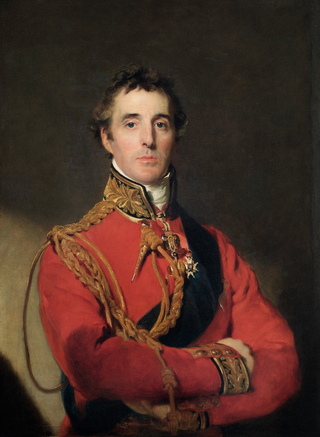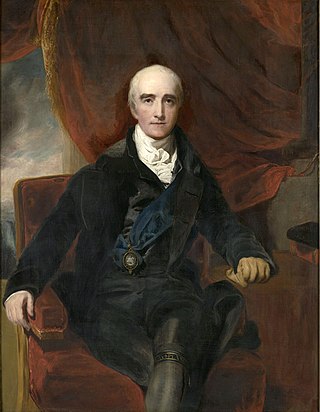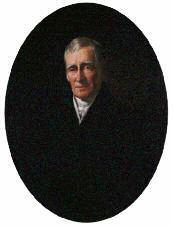
Field Marshal Arthur Wellesley, 1st Duke of Wellington, was a British statesman, soldier, and Tory politician who was one of the leading military and political figures of 19th-century Britain, serving twice as prime minister of the United Kingdom. He is among the commanders who won and ended the Napoleonic Wars when the Seventh Coalition defeated Napoleon at the Battle of Waterloo in 1815.

Duke of Wellington is a title in the Peerage of the United Kingdom. The name derived from Wellington in Somerset. The title was created in 1814 for Arthur Wellesley, 1st Marquess of Wellington, the Anglo-Irish military commander who is best known for leading the decisive victory with Field Marshal von Blücher over Napoleon's forces at Waterloo in Brabant. Wellesley later served twice as British prime minister.

Robert Banks Jenkinson, 2nd Earl of Liverpool, was a British Tory statesman who served as Prime Minister of the United Kingdom from 1812 to 1827. He also held many other important cabinet offices such as Foreign Secretary, Home Secretary and Secretary of State for War and the Colonies. He was also a member of the House of Lords and served as leader.

Richard Colley Wellesley, 1st Marquess Wellesley, was an Anglo-Irish politician and colonial administrator. He was styled as Viscount Wellesley until 1781, when he succeeded his father as 2nd Earl of Mornington. In 1799, he was granted the Irish peerage title of Marquess Wellesley. He was also Lord Wellesley in the Peerage of Great Britain.

Lieutenant-General Arthur Richard Wellesley, 2nd Duke of Wellington,, styled Lord Douro between 1812 and 1814 and Marquess of Douro between 1814 and 1852, was a British soldier and politician. The eldest son of Arthur Wellesley, 1st Duke of Wellington, victor of Waterloo and Prime Minister, he succeeded his father in the dukedom in 1852 and held minor political office as Master of the Horse from 1853 to 1858. In 1858, he was made a Knight of the Garter.

Earl of Mornington is a title in the Peerage of Ireland. It was created in 1760 for the Anglo-Irish politician and composer Garret Wellesley, 2nd Baron Mornington. On the death of the fifth earl in 1863, it passed to the Duke of Wellington; since that date, the title has generally been used by courtesy for the heir apparent to the heir apparent to the dukedom.

Earl Cowley is a title in the Peerage of the United Kingdom. It was created in 1857 for the diplomat Henry Wellesley, 2nd Baron Cowley. He was Ambassador to France from 1852 to 1867. He was made Viscount Dangan, of Dangan in the County of Meath, at the same time as he was given the earldom. This title is also in the Peerage of the United Kingdom. Lord Cowley was the eldest son of Henry Wellesley, 1st Baron Cowley, who like his son served as Ambassador to France. In 1828 he was created Baron Cowley, of Wellesley in the County of Somerset, in the Peerage of the United Kingdom. A member of the prominent Wellesley family, Cowley was the fifth and youngest son of Garret Wellesley, 1st Earl of Mornington, and the younger brother of Arthur Wellesley, 1st Duke of Wellington, and Richard Wellesley, 1st Marquess Wellesley.

Charles Arbuthnot was a British diplomat and Tory politician. He was Ambassador to the Ottoman Empire between 1804 and 1807 and held a number of political offices. He was a good friend of the Duke of Wellington. His second wife, Harriet, became a hostess at Wellington's society dinners, and wrote an important diary cataloging contemporary political intrigues.

William Wellesley-Pole, 3rd Earl of Mornington,, known as Lord Maryborough between 1821 and 1842, was an Anglo-Irish politician and an elder brother of the Duke of Wellington. His surname changed twice: he was born with the name Wesley, which he changed to Wesley-Pole following an inheritance in 1781. In 1789 the spelling was updated to Wellesley-Pole, just as other members of the family had changed Wesley to Wellesley.

Garret Colley Wesley, 1st Earl of Mornington was an Anglo-Irish politician and composer, as well as the father of several distinguished military commanders and politicians of Great Britain and Ireland.

Henry Wellesley, 1st Baron Cowley GCB was an Anglo-Irish diplomat and politician. He was the younger brother of the soldier and politician the first Duke of Wellington. He is known particularly for his service as British Ambassador to Spain during the Peninsular War where he acted in cooperation with his brother to gain the support of Cortes of Cádiz. His later postings included being Ambassador in Vienna where he dealt with Metternich and British Ambassador to France during the reign of Louis Philippe I.

Elizabeth Wellesley, Duchess of Wellington, was a daughter of the 8th Marquess of Tweeddale. Her husband, Lord Douro, succeeded his father as Duke of Wellington in 1852. She served as Mistress of the Robes to Queen Victoria from 1861 to 1868, and again from 1874 to 1880.

Arthur Charles Valerian Wellesley, 9th Duke of Wellington, 9th Prince of Waterloo, 10th Duke of Ciudad Rodrigo, 9th Duke of Victoria, GE, OBE, DL, styled Earl of Mornington between 1945 and 1972 and Marquess of Douro between 1972 and 2014, is a British peer and politician. He served as Conservative Member of the European Parliament for Surrey (1979–1984) and Surrey West (1984–1989) and sits as a hereditary peer in the House of Lords.

William Pole-Tylney-Long-Wellesley, 4th Earl of Mornington was an Anglo-Irish nobleman notorious for his dissipated lifestyle.

Richard Colley Wesley, 1st Baron Mornington was an Irish peer, best remembered as the grandfather of Arthur Wellesley, 1st Duke of Wellington.
Henry Colley was an Irish Member of Parliament. He was a member of the same family as the Duke of Wellington.
Henry Colley (1648–1719) was an Irish Member of Parliament.
Sir Thomas Cusack (also spelt Cusacke or Cusake) (1490–1571) was an Anglo-Irish judge and statesman of the sixteenth century, who held the offices of Master of the Rolls in Ireland, Lord Chancellor of Ireland, and Chancellor of the Exchequer of Ireland, and sat in the Irish House of Commons. He was one of the most trusted and dependable Crown servants of his time, although he led a somewhat turbulent private life.

Anne Wellesley, Countess of Mornington was an Anglo-Irish aristocrat. She was the wife of Garret Wesley, 1st Earl of Mornington and mother of the victor of the Battle of Waterloo, Arthur Wellesley, 1st Duke of Wellington.

Louisa Theodosia Jenkinson, Countess of Liverpool was a British noblewoman and the first wife of Robert Jenkinson, 2nd Earl of Liverpool, who served as prime minister from 1812 to 1827.

















